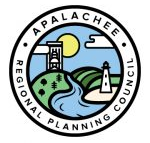ARPC staff fill the coordinator and administrator positions for the Riparian County Stakeholder Coalition (RCSC). The RCSC, comprised of the six riparian counties that border the Apalachicola River, includes Calhoun, Franklin, Gadsden, Gulf, Jackson, and Liberty counties. The RCSC was created by Resolution in 2007 and by Compact Agreement in 2012 to protect, support, and maintain the values of the Apalachicola River riparian counties both individually and collectively. The RCSC allows for the six counties to speak in one unified voice, provide a one point-of-contact for management issues and programs relating to the Apalachicola River, and promote the need for State and Federal funding to conduct technical evaluations and documentation.
Riparian County Stakeholder Coalition (RCSC)
Large strides have been made in the last year and we hope to keep working but need your support:
1) A nationally recognized and attended conference on the Apalachicola River and Bay was organized by the RCSC with other partners.
2) The Supreme Court remanded the case back to the Special Master this week after finding Florida to be injured by Georgia’s actions. The Special Master heavily referenced the RCSC-funded SWMP during the initial case and we expect he will continue to do so. This document, written with YOUR needs in mind, can help support the goals of the Counties.
3) The RCSC Coordinator now serves as the Vice Chair for the ACF Stakeholders. Here we have been working with federal agencies for drought planning to keep levels on the River higher. The National Weather Service told us in June that if we develop a better model for them to use, they will seriously consider using it. This could be great news for the Apalachicola.
4) The RCSC is working with the National Fish and Wildlife Foundation to potentially develop restoration priorities with private dollars. Millions of dollars are waiting to be leveraged.
Below are the minutes from the June 2018 meeting:
The Riparian County Stakeholders Coalition submitted a project referred to as the Comprehensive Apalachicola Recovery and Management Plan into the Florida Department of Environmental Protection RESTORE Portal on February 16, 2016.
The proposed Comprehensive Apalachicola Watershed Recovery and Management Plan would include:
1) an inclusive and broad planning process that addresses the needs of a diverse group of the Apalachicola Watershed’s stakeholders;
2) a recognition of the balance between ecosystem, community, and economic health;
3) an understanding that activities on the land have an impact on adjoining water bodies; and
4) a focus on continuing the State of Florida and Federal Agencies’ goals of restoring, protecting and maintaining the viability of the ecological functions of the natural system and the natural resource based economy that these functions support.
The Comprehensive Apalachicola Watershed Recovery and Management Plan initiative recognizes that there are many studies and projects underway or proposed to benefit the environmental quality of the Apalachicola Watershed. However, there is no single document that ties all the efforts together in a comprehensive integrated watershed plan. There is a need for the stakeholders that live and work in the Apalachicola Watershed to have an opportunity to be actively engaged in the future of the Watershed. Local stakeholders will be coordinated and involved through the Riparian County Stakeholder Coalition (RCSC). The Apalachee Regional Planning Council (ARPC) will administer and coordinate the project including but not limited to: contracting with the FL Dept. of Environmental Protection (FDEP) and other sub-consultants as needed; organizing the stakeholders; and coordinating the activities of the RCSC.
The scope of work for the proposed project will be built upon existing planning efforts occurring in the Apalachicola Watershed, most notably the updating of the Apalachicola River and Bay Surface Water Improvement and Management (SWIM) Plan as well as upon other reports such as: the ACF Stakeholders Sustainable Water Management Plan (SWMP); the Apalachicola River Mussel Habitat Restoration/Fluvial Geomorphic Assessment; and other Apalachicola Bay Watershed Restoration projects funded by the Gulf Restoration Council, the National Fish and Wildlife Foundation (NFWF), the Florida Fish and Wildlife Conservation Commission (FWC), and the National Oceanic and Atmospheric Administration (NOAA). Additionally, local comprehensive plans will be paramount as this effort views local government and stakeholder engagement as absolute essentials in order to achieve effective implementation of the Comprehensive Apalachicola Watershed Recovery and Management Plan.
This project is number 1428 and full project submission can be found here.
